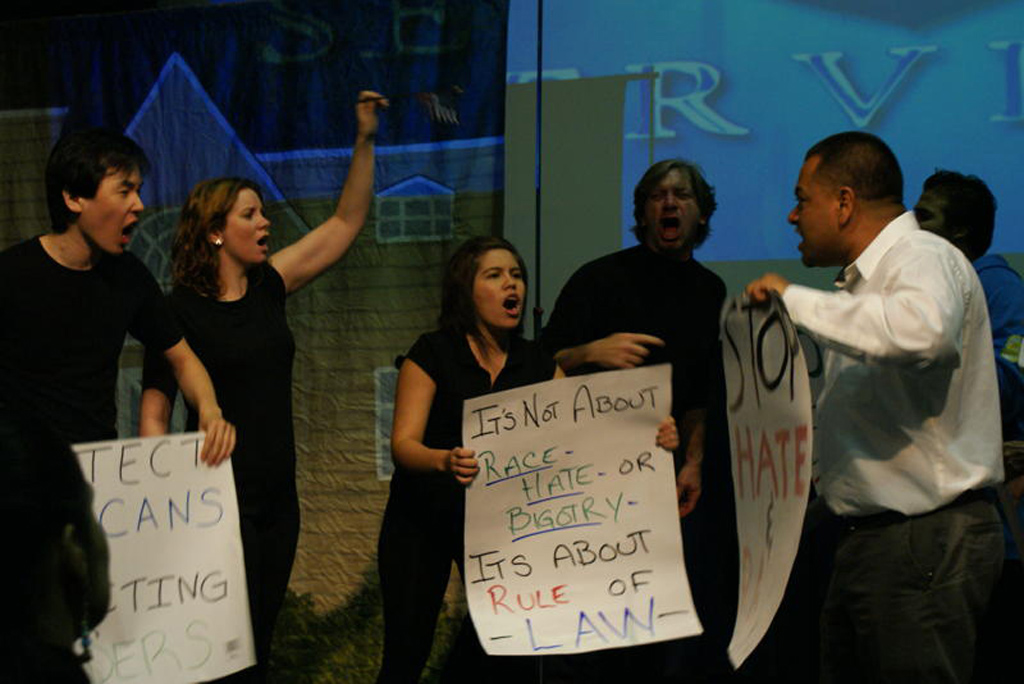By Courtney Walsh, Assistant News Editor
Students piled into seats, lined plaza room walls and took up essentially every square inch of the Mack Student Center on Oct. 27for Hofstra's eighth annual Day of Dialogue. Since its premier in 2004 Day of Dialogue has received rave reviews from faculty and staff. Hofstra professor and Director for the Center for Civic Engagement Cynthia Bogard estimated that over 2000 students attended the event.
Day of Dialogue VIII: Public Issues in a Global World hosted 21 events including debates, panels and performances focusing on issues both the United States and the world are currently facing. One of the main themes, immigration, took up three of the 21 Day of Dialogue events including a discussion on Drug Wars in Mexico lead by freelance journalist Froylán Encisco Higuera. Hofstra's radio station WRHU 88.7 F.M. held a panel titled From the Border Wall to the Classroom, Arizona to Patchoque: Immigration as a Human Rights Issue which was hosted by Hofstra Professor Mario Murillo.
The most anticipated events were Park 51: A Mosque at Ground Zero? and Telling in Living Color: Gay Veterans of Color Talk About Don't Ask Don't Tell, Human Trafficking: 21st Century Slavery, a panel lead by four military veterans and a moderator from the Gay & Lesbian Alliance Against Defamation. With an attendance near 200 students, Robert Smith, Jules Sohn, Marquell Smith, Earl Morrow and Anthony Melendez spoke about their experience under DADT - or "Don't Ask, Don't Tell" - and the how the policy "disproportionately discharges soldiers of color" in comparison to Caucasian discharges.
"Our focus is always whatever issues are most important at the time, but also some issues that never really go away," said Bogard.
The day's events included free admission and were open to the public, but the crowd mainly consisted of Hofstra students and faculty.
"We started Day of Dialogue in spring 2004. Some professors including myself got together and said, ‘Wow!' There's a really important election coming up and we don't think our students know enough about public issues that are facing the country," said Bogard.
At the time Bogard and her colleagues had no idea what to expect. Over 1100 students and faculty came out for the first Day of Dialogue and over 3500 for the second. Since then the Center for Civic Engagement in partnership with the Office of the Provost and Senior Vice President for Academic Affairs has hosted Day of Dialogue each fall.
"A lot of faculty members and student associations step foreword to offer to host an event, so it's really a collaboration of a number of different people and I'm the one who just puts it altogether," said Bogard.
Events are planned in advance and times are carefully calculated to provide the best turnout possible.
"I look through the class list and if I see that there are allot of… say economics classes at four o-clock we'll schedule an economic event at that time," said Bogard.
In 2007 Bogard published an article about the 2004-2006 Day of Dialogues demonstrating a positive correlation between Dialogue attendance (regardless of whether a student was forced to attend by their professor or went by choice) and the likelihood of a student turning out at the polls on Election Day.
"So in other words Day of Dialogue does increase interest and awareness of issues and even effects their voting behavior," said Bogard.
The evening came to a close with a performance of What Killed Marcelo Lucero? enacted by "actor-vists" of Teatro Experimental Yerbabruja Inc. Written and Directed by Margarita Espada What Killed Marcelo Lucero? explores the political and social issues surrounding the death of Ecuadorian immigrant Marcelo Lucero in 2008. Last year as part of the National Center for Suburban Studies' conference on Suburban Diversity the University hosted the play's debut, and brought it back this year just short of the anniversary of Lucero's death.
"Having a mix of things, so it's not just talking heads, is an important part too," Bogard said. "You don't have to learn through people talking at you, you can also learn through an enjoyable performance."

(Courtney Walsh/The Chronicle)


